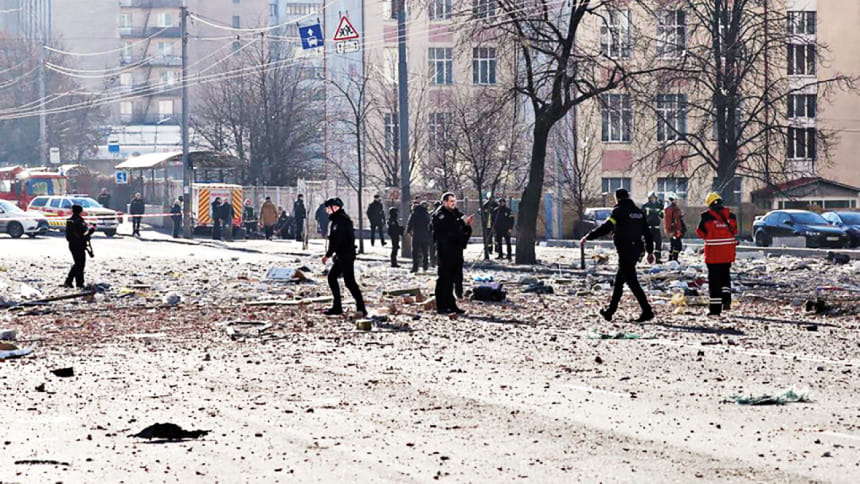The Ukraine crisis amid fractured international legal order - hypocrisy of powerful

It is not only Putin who violates international law. The US too refuses to be bound by international law. We well remember Bush's claim that 'the UN Charter is dead, and the US is not bound by international law'. This rejection of the international order has exposed its arrogant unilateralism in zealously guarding its authoritative militaristic and dogmatic patriotic behaviour.
The ongoing Russian invasion of Ukraine once again has solicited world attention to the international legal order that has repeatedly been fractured by powerful states in the post-cold war era. Obviously, the Russian invasion of Ukraine is illegal in international law and a clear violation of the peremptory norm of prohibition of force in international relations and non-intervention under Article 2(4) of the UN Charter. The West has reacted angrily and held Russia responsible for violating Ukraine's sovereignty in total disregard of international law and bombarded with sanctions. In an identical way Russia opposed and condemned the US and its allies' invasion of Iraq in 2003. The world is too familiar with the military posturing of powerful states imposing their vested interests despotically by sheer power. These military adventures and reactions by powerful states exhibit the hallmark of cold war that has coerced and vandalised the international legal order, the bedrock of world peace and security.
The end of the cold war in the early 1990s offered a new world order with hopes to move from independence to interdependence and confrontation to collaboration. It created a new unipolar world with the US as the only superpower. The US was in a unique position to establish a peaceful world. Instead, the US opted to elevate itself to the status of an 'exceptional state', strengthened its alliance with other western and non-western states and pursued its so-called 'assertive multilateralism' to advance its foreign policy, strategic goals, and economic interests. It projected a self-perpetuating image of benevolent leader in international rule-making and standard-setting that were implemented selectively only to advance its strategic interests through military might, economic coercions, and veto power in the UN Security Council (SC). It continually exonerated itself from abiding by international legal principles it promotes for others. This unilateralism fragmented international law and weakened its regulatory authority to the extent that it can no longer ensure the peaceful co-existence of states, powerful and weak alike. This is how the US and its western allies pursued their version of a 'just world order' that was a major contributor to the downfall of the world order propelled by the rule of law.
The sovereign equality of states is meant to address global power imbalance, protect vulnerable small states from powerful states. This legal order is being routinely undermined by powerful states, which have introduced a pervasive tendency of reducing the international legal order subservient to their self-interest. Their asymmetric power has grown so exponentially that has rendered them more equal than others. Small states, which are not enamoured with their hierarchical power, are less sovereign and overwhelmed by predatory power, as has happened in the invasion of Ukraine, 20 years after the invasion of Iraq. Is Putin's invasion different from the Iraqi invasion? Is Putin's recognition of the Ukrainian breakaway republics worst than the US recognition of Jerusalem as the capital of Israel? How would the West and its allies justify their violent occupation of Iraqi and Palestinian territories against Putin's forcible occupation of Ukraine? How would the former justify 53 US vetoes on SC resolutions criticising Israeli illegal occupation of Palestinian territory against Russian veto on SC resolution condemning Russian aggression on Ukraine. The chronology of manufactured wars against those states not submissive to the will of powerful states suggest that what Putin has started in Crimea and Ukraine, the West has already done that to destroy Iraq, Libya, and Afghanistan with absolute impunity in the post-cold war era.
It is not only Putin who violates international law. The US too refuses to be bound by international law. We well remember Bush's claim that 'the UN Charter is dead, and the US is not bound by international law' (The Observer, London, 14 July 2002, p 14). This rejection of the international order has exposed its arrogant unilateralism in zealously guarding its authoritative militaristic and dogmatic patriotic behaviour. Antiwar public demonstration around the World including in Russia has not deterred Putin in the same way unprecedented worldwide public demonstration failed to deter Bush, Blair, and Howard from attacking Iraq on the false pretext of possessing weapons of mass destruction (WMDs). These western leaders were never brought to justice for committing war crimes. Putin has regarded Ukraine's bid to join NATO a threat to Russian security and asked the West not to expand NATO to its backyard. Putin's demand is an interference with the independent decision-making of Ukraine. But the West and its allies have been pursuing the same policy to prevent Iran from developing alleged nuclear weapons that the West thinks would destabilise the power balance in the Middle East, where Israel is the only nuclear power. Iran has been bearing the full brunt of successive sanctions by the US and its allies to deny Iran its sovereign right that the US and other nuclear weapon states take for granted. No nuclear state has signed and/or ratified the Nuclear Weapons Prevention Treaty 2017.
NATO, a cold war leftover, remains the western military muscle to dominate the world through gunboat diplomacy. The proposed NATO membership of Ukraine has led Putin to attack, which NATO has termed 'reckless'. NATO has forgotten what massacre it had inflicted on Libya in 2011 as the mercenary of the West. The US claims that Putin is set to remove the present pro-West government of Ukraine by a pro-Russian government. This is precisely what the US and its allies did in Libya (and Iraq, attempted in vain in Syria) in violation of the SC resolution 1973 (2011). Putin has been branded as a war criminal to be brought to justice. Neither Russia nor the US are party to the International Criminal Court (ICC). The US did everything to frustrate the ICC. Bush enacted the American Service Members Protection Act 2002 prohibiting US cooperation with the ICC and allowing the President to use all means to release its nationals in ICC custody for committing ICC crimes. It concluded agreements with states under intimidation requiring them not to surrender to the ICC any US nationals guilty of the ICC crimes. It threatened to veto the renewal of the UN-led peacekeeping operations if its peacekeepers were not granted immunity from the ICC prosecution. It refused entry of the ICC prosecutor to investigate whether the US troops committed war crimes in Afghanistan.
This write-up highlights the credibility crisis of the West in resisting Putin's aggression. Notwithstanding worldwide antiwar demand for peace and security, the post-cold war era is dominated by leaders with cold war confrontationist mindset, who think they alone can solve world problems by force. Consequently, the international legal order continues to eclipse under the shadow of power. The US and its allies first and now Putin have invented legitimacy of invasions through power yet opposing each other's invasion as illegal. This is how they have divided the world, swallowed international law, and vandalised the international order by provocative double-standards and shedding crocodile tears for legitimacy with veiled ulterior geostrategic and arms trading motives.
The writer is Emeritus Professor of Law, Macquarie University, Sydney, Australia.

 For all latest news, follow The Daily Star's Google News channel.
For all latest news, follow The Daily Star's Google News channel. 



Comments